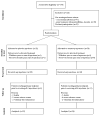A randomized, double-blinded, placebo-controlled multicenter trial of etanercept in the treatment of alcoholic hepatitis
- PMID: 18848937
- PMCID: PMC2639749
- DOI: 10.1053/j.gastro.2008.08.057
A randomized, double-blinded, placebo-controlled multicenter trial of etanercept in the treatment of alcoholic hepatitis
Abstract
Background & aims: Alcoholic hepatitis is a cause of major morbidity and mortality that lacks effective therapies. Both experimental and clinical evidence indicate that the multifunctional cytokine tumor necrosis factor-alpha (TNF-alpha) contributes to pathogenesis and clinical sequelae of alcoholic hepatitis. A pilot study demonstrated that the TNF-alpha-neutralizing molecule etanercept could be an effective treatment for patients with alcoholic hepatitis.
Methods: Forty-eight patients with moderate to severe alcoholic hepatitis (Model for End-Stage Liver Disease score > or = 15) were enrolled and randomized to groups that were given up to 6 subcutaneous injections of either etanercept or placebo for 3 weeks. Primary study end points included mortality at 1- and 6-month time points.
Results: There were no significant baseline differences between the placebo and etanercept groups in demographics or disease severity parameters including age, gender, and Model for End-Stage Liver Disease score. The 1-month mortality rates of patients receiving placebo and etanercept were similar on an intention-to-treat basis (22.7% vs 36.4%, respectively; OR, 1.8; 95% CI, 0.5-6.5). The 6-month mortality rate was significantly higher in the etanercept group compared with the placebo group (57.7% vs 22.7%, respectively; OR, 4.6; 95% CI, 1.3-16.4; P = .017). Rates of infectious serious adverse events were significantly higher in the etanercept group compared with the placebo group (34.6% vs 9.1%, respectively, P = .04).
Conclusions: In patients with moderate to severe alcoholic hepatitis, etanercept was associated with a significantly higher mortality rate after 6 months, indicating that etanercept is not effective for the treatment of patients with alcoholic hepatitis.
Conflict of interest statement
Figures


References
-
- McCullough A, O’Connor J. Alcoholic liver disease: proposed recommendations for the American College of Gastroenterology. Am J Gastroenterol. 1998;93:2022–2036. - PubMed
-
- Lieber C. Alcoholic liver disease: new insights in pathogenesis lead to new treatments. J Hepatol. 2000;32:113–128. - PubMed
-
- Menon K, Gores G, Shah V. Pathogenesis, diagnosis, and treatment of alcoholic liver disease. Mayo Clin Proc. 2001;76:1021–1029. - PubMed
-
- Baker AL, Jaspan JB, Haines NW, Hatfield GE, Krager PS, Schneider JF. A randomized clinical trial of insulin and glucagon infusion for treatment of alcoholic hepatitis: progress report in 50 patients. Gastroenterology. 1981;80:1410–4. - PubMed
-
- Halle P, Pare P, Kaptein E, Kanel G, Redeker A, Reynolds T. Double-blind, controlled trial of propylthiouracil in patients with severe acute alcoholic hepatitis. Gastroenterology. 1982;82:925–31. - PubMed
Publication types
MeSH terms
Substances
Grants and funding
LinkOut - more resources
Full Text Sources
Other Literature Sources

